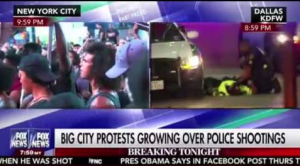We are living at a time when the church can not simply focus on the spiritual growth of our members while ignoring the larger issues of our culture. We become more like Jesus, not by isolating ourselves from the world, but by engaging the world with a message of hope.
 The brutal events of these past weeks, the killings of two black men and of five Dallas police officers and the wounding of others, have reminded us that we live in a broken world. There is mistrust, there is hatred, and there is violence. Our hearts go out to the friends and families of victims of these horrible tragedies. We grieve and we mourn with them. We acknowledge their pain and commit ourselves to pray for and work for justice on their behalf. As Jesus taught us to pray,
The brutal events of these past weeks, the killings of two black men and of five Dallas police officers and the wounding of others, have reminded us that we live in a broken world. There is mistrust, there is hatred, and there is violence. Our hearts go out to the friends and families of victims of these horrible tragedies. We grieve and we mourn with them. We acknowledge their pain and commit ourselves to pray for and work for justice on their behalf. As Jesus taught us to pray,
Thy kingdom come.
Thy will be done in earth,
as it is in heaven.~Matthew 6:10
This world needs a message of justice and also forgiveness, the message of reconciliation proclaimed by Jesus Christ. Christ followers are called not just to proclaim reconciliation but also to model it, not lashing out with assumptions and accusations, not retaliating when wronged, but patiently absorbing the anguish and anger of this fallen world.
For God was in Christ, reconciling the world to himself, no longer counting people’s sins against them. And he gave us this wonderful message of reconciliation.
~2 Corinthians 5:19, NLT
To become ministers of reconciliation we must build bridges across ethnic, social, and sectarian chasms and get to know people who are different from us. The line that divides is not between black and white or black and blue; the line is between love and hate and it runs right though the human heart. Every person is capable of love and hate. Isolation leads to fear. Fear drives us to hate. “But perfect love drives out fear…” (The Apostle John, 1 John 4:18, NIV).
To love means to become vulnerable. Jesus said, “Greater love has no one than this: to lay down one’s life for one’s friends” (John 15:13, NIV). The Apostle Paul said, “God demonstrates his own love for us in this: While we were still sinners, Christ died for us.” (Romans 5:8, NIV). The Apostle Peter said, “[Jesus] did not retaliate when he was insulted, nor threaten revenge when he suffered. He left his case in the hands of God, who always judges fairly” (1 Peter 2:23, NLT).
Love is hard, it’s perilous, but it’s the only path to justice.
In his address today, President Obama reminded us of our need to have civil conversations about the issues that divide us. He’s right; we need to talk about racial justice, gun control, immigration, sexual morality, health care, abortion, and religious freedom. We need to have these conversations out of genuine concern for the welfare of everyone involved not just with the aim of protecting our own rights and privileges.
And today, we need to grieve together.
 What do people expect when they come to church? Uplifting music? An encouraging sermon? Prayer? These are natural expectations but are they compelling enough to make church attendance a vital part of their lives? Apparently fewer and fewer of us think so. After decades of declining church attendance, fewer than 18% of us now find ourselves in church on any given Sunday.
What do people expect when they come to church? Uplifting music? An encouraging sermon? Prayer? These are natural expectations but are they compelling enough to make church attendance a vital part of their lives? Apparently fewer and fewer of us think so. After decades of declining church attendance, fewer than 18% of us now find ourselves in church on any given Sunday.